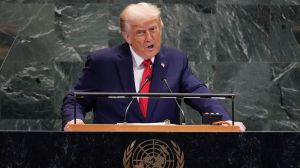Oceania members fall out on Dempsey’s stand
Auckland, July 11: New Zealand football official Charlie Dempsey received the support of Tonga and Samoa on Tuesday for turning his back o...

Auckland, July 11: New Zealand football official Charlie Dempsey received the support of Tonga and Samoa on Tuesday for turning his back on South Africa’s 2006 World Cup bid, but other Oceania countries denied claims they approved his decision.
Ropati Enosa, secretary of the Samoa Soccer Federation, said he supported Dempsey, the Oceania Football Confederation (OFC) president, who abstained from the vote which allowed Germany to win the race for the World Cup by one vote.
“The president used his discretion to choose what was best for the organisation,” Enosa said from Apia. By abstaining in response to attempted bribes and threats he claimed Dempsey had ensured Oceania’s reputation.
Ahongalu Fusimalohi, the Tongan OFC member, said Dempsey had been treated unfairly as the majority of Confederation members had backed his decision to abstain.
Confederation secretary-general Josephine King — Dempsey’s daughter — says she told Dempsey before the vote that six of the 11 OFC members agreed that he should vote as he saw fit.
Fusimalohi confirmed on Tuesday that Tonga was one of the countries that agreed to give Dempsey a free vote. He told National Radio he understood the other countries were American Samoa, Samoa, Cook Islands, Australia and New Zealand.
Fusimalohi said the six members had given Dempsey a freevote during a tele-conference call before the FIFA ballot was taken last Thursday.
“I think Dempsey has been unfairly treated and I think his actions were justified, because it was us, the executive committee, that changed its earlier decision in Apia to opt for South Africa and instead allowed Dempsey the freedom of choice,” he said.
However, Australia, Cook Islands and New Zealand have all denied changing their stance.
New Zealand Soccer Chief executive Bill MacGowan said Fusimalohi’s comments were a surprise.
“Everyone has been contacted and everyone has confirmed they supported the status quo,” MacGowan said.
MacGowan said King rang Oceania members individually, asking them to give Dempsey a free vote, which was inappropriate.
“New Zealand delegate Mark Burgess was adamant that our position hadn’t changed. He has witnesses to back up his position, he actually took the call in his car.”
However, Dempsey believes his decision to align with Europe’s eight members and Asia’s four, who were understood to have voted for Germany, had helped Oceania win support for a direct entry to the 2006 World Cup.
Dempsey was scheduled to return to Zurich in August for another FIFA executive committee meeting when he will plead Oceania’s bid for a direct qualifier for future World Cup tournaments.
“I was concerned only in the best interests of the OFC. There are still many hurdles to be jumped including direct (World Cup) entry,” he said.
Despite the furore, South African president Thabo Mbeki appears to hold no grudges against the New Zealand government, telling Prime Minister Helen Clark he was sure she was as surprised as he was at Dempsey’s decision.
“I am certain that you were as surprised and distressed at Dempsey’s extraordinary decision to abstain in the last round of voting as we, the rest or our continent and other parts of the world are and will continue to be,” he said in a letter, dated July 7 and released to the media on Tuesday.
Mbeki said the “sense of incredulous disappointment” among South Africans over Dempsey’s decision was palpable and that long-term damage had been inflicted on the sport.
“The Zurich decision communicates the message to us that concept of human solidarity is foreign to some of those who are powerful,” he said.
“At some point, the agony of millions must surely come to an end. Time will tell who will act with Africa’s people to achieve this result.”
Photos



- 01
- 02
- 03
- 04
- 05




























